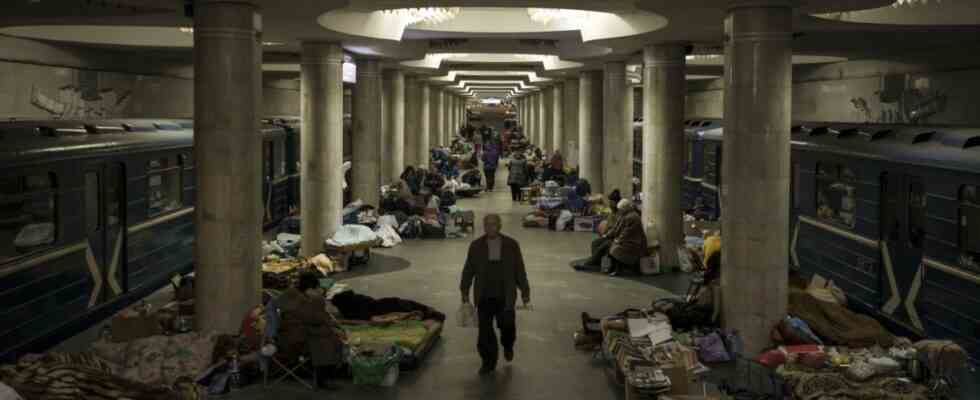Frauke Ossig organized help for people in the Ukrainian city of Kharkiv for the organization Doctors Without Borders and has just returned to Germany. One of the most important locations for the teams are the subway stations, where residents take shelter every night.
SZ: Ms. Ossig, you have been to many crisis regions, what is different in Kharkiv?
Frauke Ossig: Each assignment is unique. What is unusual about the mission in Kharkiv is the life underground. So the many people who are in the subway stations and who we take care of there. We’ve seen up to 700 people a night in one station.
How long do people stay there?
In Kharkiv there are air raid alarms about four to five times a night. Then many people seek shelter in the subway stations, through which no trains have come for weeks. Many of those seeking protection stay there all night because the city has a curfew from 6 p.m. to 6 a.m. Some of the subway stations are then closed. The residents go to the stations before the curfew begins, put their mattresses on the floor, spend the night there and go home or to work in the morning. But there are also numerous residents who no longer dare to leave the stations. Especially in the northeast of the city, where there are many bombings, people have been living in the metro stations for days or even weeks. Then there are people from the regions around Kharkiv whose houses have been destroyed and who have fled to the city but have no one to go to. They remain permanently in the stations because they find safety and a minimum of care there.
What about heat, electricity and plumbing?
It’s cold in the wards, they aren’t heated all the time. There are occasional power outages, but most of the time there is power. And there is help. The solidarity among the population is extremely high. Volunteers and aid organizations bring beds, blankets, food, paper and pens for the children. The toilets in the train stations are actually not enough. But people come to terms with it and deal with the situation very responsibly. The facilities are very clean for the conditions. But there are no showers for those who are permanently in the shafts. That becomes a problem.
Frauke Ossig has been working for Doctors Without Borders for twelve years. She has been the emergency coordinator for the organization for the past seven years. Its locations include Syria, Yemen, South Sudan, Bangladesh, Sierra Leone, Armenia, Belarus, the Kashmir region and now Ukraine.
(Photo: private/private)
How did you find the atmosphere in the subway stations?
It’s quiet, almost too quiet. You can feel the enormous tension people are under and the extreme experiences they have had. We see more and more psychological complaints. Many people in the underground tunnels cannot sleep. They live in constant fear that Russian troops are approaching. Many are also traumatized. Family separation is a problem. Sometimes people can no longer reach their loved ones. Then nervousness and fear continue to rise.
How can you help?
Sometimes we are in the wards all night and we also have psychologists on our team. We say to those seeking protection: “We are here all the time. You can come to us.” Talking helps people. But it is only a first relief. Those affected will need long-term psychological support.
What other complaints have you seen?
We mainly receive patients with chronic diseases such as high blood pressure, diabetes and thyroid diseases. We know this from other wars and conflicts: people run out of medication and the situation can quickly become life-threatening. This also contributes to the fear of the residents. We saw a man quarter his high blood pressure medication so he could last longer. This is a sign that people no longer have any security. That they no longer know what will happen to them in the next few days. This tension of the patient can be felt extremely.
The proportion of chronically ill and old people is relatively high in Ukraine …
Yes, and the elderly are currently the most vulnerable. They’re the least flexible. Some encouraged their families to flee, but were unable or unwilling to go with them. They are now sitting at home alone, the elevators no longer work, they cannot manage the stairs. They are also cut off from medical care. Our teams, with the help of city volunteers, are therefore trying to identify these people and go to them during the day when the service in the subway stations has ended.
Do you also see many injured people?
Injured people are mainly treated in the clinics. The hospitals and ambulances are still working. We therefore have the wounded brought to the clinics.
And what about Corona?
Corona is currently not a very big issue for people in Ukraine. We see many people with respiratory illnesses and treat the symptoms as best we can. But there are not enough ways to test whether it is Corona or another infection.
Where do you reach your limits with your possibilities?
Limits are mainly set by the fights. We cannot always reach all areas. There are constant warnings of new attacks. We then have to keep rescheduling, because we also have to protect our own employees.
How do you ensure your own safety?
We often stay in the subway stations at night, also to have time for the people there. But we had the situation several times that we couldn’t leave the wards in the morning because the alarm had gone off again. We then walk through the tunnels to the next station to help there. But in everything we face the same uncertainties as the residents of Kharkiv. We do not know when and where the next bombing will take place. This unpredictability is extremely difficult for everyone there.

